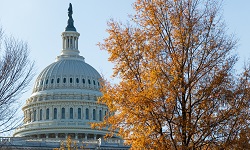 Hill Update: Congress Averts Shutdown; NDAA Stalls in the Senate
Hill Update: Congress Averts Shutdown; NDAA Stalls in the Senate
Yesterday, Congress averted a government shutdown by passing a continuing resolution (H.R. 6119) to fund the federal government through February 18. The House voted 221-212 and the Senate voted 69-28 to clear the bill before tonight’s deadline; President Biden signed the bill today. The bill includes funding to aid the resettlement of Afghan refugees and services for unaccompanied minors crossing the United States-Mexico border. The measure gives Senate appropriators additional time to negotiate on FY22 funding bills; Senate Republicans continue to press Democrats to agree to keep legacy riders and eliminate “poison pills” to help reach an agreement.
The National Defense Authorization Act, meanwhile, has stalled in the Senate after Republicans opposed the Democrats’ proposal to unanimously support a vote on a package of more than 20 amendments. According to Punchbowl News, members from the House and Senate Armed Services Committees are now working on a deal to “pre-conference” a compromise package for a vote in the House next week. The Senate would then vote on the package once it clears the House.
 FEATURED RESOURCE: AAU Urges Congress to Finish FY22 Appropriations
FEATURED RESOURCE: AAU Urges Congress to Finish FY22 Appropriations
 AAU, Associations Submit Joint Comment Letter on DACA Rulemaking
AAU, Associations Submit Joint Comment Letter on DACA Rulemaking
AAU joined ACE and 44 other higher education associations in responding to the Department of Homeland Security’s notice of proposed rulemaking on the Deferred Action for Childhood Arrivals program. The joint letter highlighted the importance of the DACA program to the higher education community and acknowledged the significant contributions DACA recipients have made to our universities and to the country. “They teach in our schools and have served on the front lines of the pandemic as researchers, doctors, nurses, and other healthcare workers. They consider the United States to be their only home, and despite the immigration, financial, and other challenges they face, DACA recipients have made incredible contributions to our country, its economy, and security,” the letter noted.
The letter acknowledged the rulemaking exercise as an important step to “further enshrine” DACA and offered comments in the spirit of strengthening the program and providing additional certainty for Dreamers. The DACA program has not undergone any formal rulemaking since it was first established in 2012.
Among other things, the letter urged DHS to extend DACA protections to more young people by changing eligibility requirements; allow applicants to continue to request DACA and work authorization as part of one application instead of making the form for work authorization optional; explicitly state that the program will accept new applications once the rule is finalized; and confirm the policy of “advance parole” that allows DACA recipients to leave the country and return. The letter also applauded the proposed rule for including provisions stating that DACA recipients should not be a priority for removal and limiting DACA information from being used for enforcement purposes.
 FEATURED RESOURCE: From Barbara's Blog: Dreamers Face a Nightmare
FEATURED RESOURCE: From Barbara's Blog: Dreamers Face a Nightmare
 White House OSTP Creates New Division Focused on Clean Energy
White House OSTP Creates New Division Focused on Clean Energy
This week the White House Office of Science and Technology Policy announced the launch of a new Energy Division focused on green energy. According to the White House press release, the new division “will develop national clean energy innovation plans to ensure America’s continued leadership in clean energy innovation and ensure the United States gets to net-zero emissions by 2050.” OSTP also appointed Sally Benson as the deputy director for energy and chief strategist for energy transition at OSTP and Costa Samaras as principal assistant director for energy and chief advisor for energy policy at OSTP.
Benson was previously the Precourt Family Professor of Energy Resources Engineering at Stanford University’s School of Earth, Energy and Environmental Sciences. Samaras comes to OSTP from Carnegie Mellon University, where he was a faculty member in the Civil and Environmental Engineering Department, the Engineering and Public Policy Department, and the Heinz School of Public Policy.
Senate HELP Committee Advances NEA and NEH Chair Nominations
Yesterday, the Senate Health, Education, Labor and Pensions Committee advanced the nominations of Maria Rosario Jackson to be the chair of the National Endowment for the Arts and Shelly Lowe to be the chair of the National Endowment for the Humanities. HELP Committee Chair Patty Murray (D-WA) highlighted the committee’s support for both nominees and applauded their commitment to education and workforce values. The nominees now move to a full Senate vote on a date that will be determined by Majority Leader Chuck Schumer (D-NY).
Maria Rosario Jackson is currently a member of the advisory boards of the Smithsonian Center for Folklife and Cultural Heritage and the Equity Center at the University of Virginia. Jackson earned a doctorate in urban planning from the University of California, Los Angeles and a master’s in public administration from the University of Southern California.
Shelly Lowe is a citizen of the Navajo Nation and currently serves as the executive director of the Native American Program at Harvard University. She has previously served as the graduate education program facilitator for the American Indian Studies Program at the University of Arizona; assistant dean in the Yale College Dean’s Office; and director of the Native American Cultural Center at Yale University.
News of Interest
The New York Times: Trust in Science and Scientists Increased Globally, Poll Finds – An international survey conducted from August 2020 to February 2021 by the Wellcome Trust revealed that about 80% of people from 113 countries trust science either “a lot” or “some” and about three fourths trust scientists “a lot” or “some.” In the United States, 54% of respondents said they trusted scientists “a lot.” A more recent poll conducted by Gallup, however, shows that confidence in science has diverged significantly along partisan lines in the United States.
Politico: China Blowback Looms for Schumer’s Innovation and Competition Act – China is promising retaliation if the U.S. Innovation and Competition Act passes and has started lobbying U.S. businesses and executives to oppose the bill. Earlier this month, Senate Majority Leader Chuck Schumer (D-NY) and House Speaker Nancy Pelosi (D-CA) announced that they will begin work to advance the bill through the conference process.
NPR: Ohio State Is Raising Millions to Erase Student Loan Debt for Undergrads – The Ohio State University, one of the largest universities in the country with more than 40,000 undergraduates, is launching a 10-year plan to raise $800 million to enable students to graduate debt-free.
Inside Higher Ed: 70 Days Away – Student loan repayments resume on February 1, 2022, nearly two years after the federal government implemented a pause in March 2020. Advocates are concerned both about whether the student loan system would be able to handle the resumption and about whether borrowers are ready and have the resources to pay.
Los Angeles Times: UC Slams the Door on Standardized Admissions Tests, Nixing Any SAT Alternative – The University of California system announced earlier this month that it is going to permanently drop testing requirements for admissions. The decision is likely to embolden other campuses looking to do the same.
Featured Research

Electric Vehicles Could Fully Recharge in Under 5 Minutes with New Charging Station Cable Design
Purdue University engineers have designed a new charging station cable that would fully recharge electric vehicles in less than five minutes. The new cable can deliver electric current 4.6 times faster than the fastest charger available on the market today.

Synthetic Tissue Can Repair Hearts, Muscles, and Vocal Cords
Scientists at McGill University have developed an injectable hydrogel that can repair the heart, muscles, and vocal cords. The hydrogel – a type of biomaterial that allows cells to live and grow – represents a major advance in regenerative medicine.